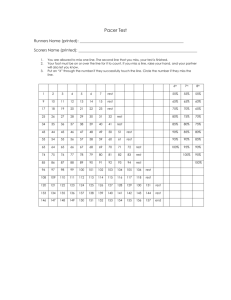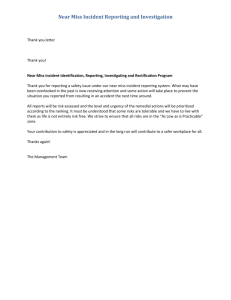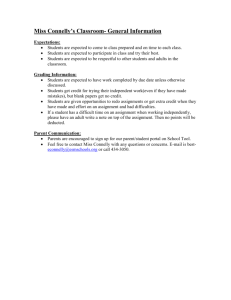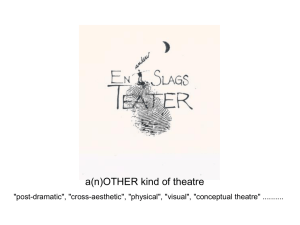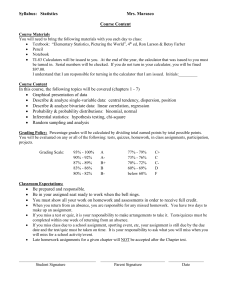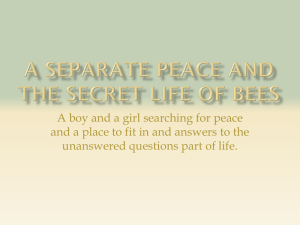FINAL_Miss Lilys Revised Teacher Notes 2015
advertisement
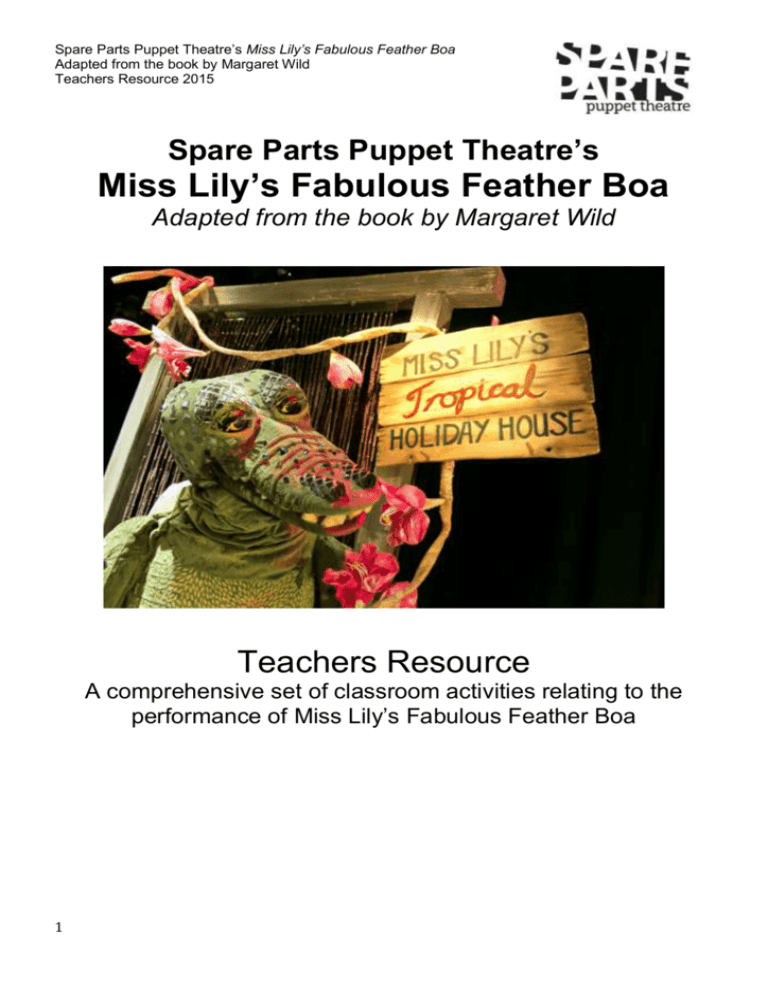
Spare Parts Puppet Theatre’s Miss Lily’s Fabulous Feather Boa Adapted from the book by Margaret Wild Teachers Resource 2015 Spare Parts Puppet Theatre’s Miss Lily’s Fabulous Feather Boa Adapted from the book by Margaret Wild Teachers Resource A comprehensive set of classroom activities relating to the performance of Miss Lily’s Fabulous Feather Boa 1 Spare Parts Puppet Theatre’s Miss Lily’s Fabulous Feather Boa Adapted from the book by Margaret Wild Teachers Resource 2015 About Miss Lily’s Fabulous Feather Boa Miss Lily’s Fabulous Feather Boa is a joyous celebration of courage, honesty and pride with a central dilemma relevant to the social development of children. Critical and creative thinking, ethical understanding, personal and social capability and literacy make this story of a gigantic crocodile’s inspiring relationship with a lonely Potoroo an important tale for any child. The Creative Team Director/Writer: Michael Barlow Designer: Iona McAuley Composer: Lee Buddle Production Manager: Elliot Chambers About Spare Parts Puppet Theatre Spare Parts Puppet Theatre is a driving force in the contemporary puppet theatre landscape in Australia. Our name reflects our ethos – to be inspired by many artists, artistic forms and ideas and fuse them with puppetry to create theatrically exciting performances. Spare Parts offers meaningful and exciting theatre experiences that respect the intelligence and emotional growth of our young audience and offer strong links to the Australian Curriculum. Puppetry uniquely addresses the imaginative mind and while Spare Parts Puppet Theatre’s focus is on young people we create work that can challenge, excite and entertain audiences of all ages. 2 Spare Parts Puppet Theatre’s Miss Lily’s Fabulous Feather Boa Adapted from the book by Margaret Wild Teachers Resource 2015 Theatre Etiquette What’s different about watching a show on TV and watching a show at the theatre? When you go to the theatre you should follow the rules below. Can you think of reasons why you should…. 3 Spare Parts Puppet Theatre’s Miss Lily’s Fabulous Feather Boa Adapted from the book by Margaret Wild Teachers Resource 2015 Table of Contents About Miss Lily’s Fabulous Feather Boa Page 2 About Spare Parts Puppet Theatre Page 2 Theatre Etiquette Page 3 Learning Activities Stealing - (Activities 1-3) Pages 5-6 Friendship - (Activities 4-7) Pages 7-8 Feelings, Emotions & Self-Esteem - (Activities 8-10) Pages 9-11 Animals - (Activities 11-13) Pages 12-14 Author Study - (Activity 14) Page 15 Miscellaneous Activities - (Activities 15-18) Pages 16-19 Music - (Activity 19) Page 19-20 Visual Arts – (Activities 20-23) Pages 21-23 4 Spare Parts Puppet Theatre’s Miss Lily’s Fabulous Feather Boa Adapted from the book by Margaret Wild Teachers Resource 2015 Stealing Activity 1 Whole class discussion of what stealing is. Brainstorm answers on whiteboard/butchers paper. Related themed based books: Ricky Sticky Fingers by Julia Cook Hand it Over Harry by Sarah Eason Come Clean Carlos by Sarah Eason Discuss & Compare: Read Miss Lily’s Fabulous Pink Feather Boa and 1 other book on same topic. Compare what the culprit did (problem) in each book and how it was dealt with (solution). Discuss consequences for such actions and would be suitable for young children vs older children and even possibly adults. Years 5 & 6: Research facts on stealing using the internet. What do people steal? Why do people steal? What consequences are there for stealing? (kids vs adults) Activity 2 Discuss what stealing is. What feelings are associated with stealing, e.g. sadness, guilt, jealousy, shame or worry. Questions: 1. Why did the potoroo snip a little piece of the boa? 2. Is it alright to steal if it makes you feel good? 3. If you only steal a little piece of something does that make it alright? 4. Is it alright to steal from people who have more than you? 5. Why do you think the author used this theme in her book? 6. What sort of words does the author use to show that the potoroo is stealing? 7. What sort of words does the author use to show the emotions the potoroo is feeling? 8. Have you ever felt the same way that the potoroo could be feeling? (good or bad) 9. Did the potoroo know between what is right and what is wrong? 10. Why did Miss Lily show compassion rather than being angry at the Potoroo? Activity 3 Divide the class into groups of or 4 and work as a team to present a role play about stealing, using the following scenarios: Someone steals money from your school bag. Someone takes your Ipod from your school bag. You are at a friend’s house and your favourite Xbox game goes missing. 5 Spare Parts Puppet Theatre’s Miss Lily’s Fabulous Feather Boa Adapted from the book by Margaret Wild Teachers Resource 2015 You see someone take something from the teachers desk that you know isn’t theirs. You see your friend taking a prize from the teachers prize box Website for teachers: Women’s and Children’s Health Network: Kids’ Health http://www.cyh.com/HealthTopics/HealthTopicDetailsKids.aspx?p=335&np=287&id=2307 ACARA Content Descriptors Activities 1-3 Links English Year 3 ACELA1476, ACELT1594, 596, 1599, ACELY1676 Year 4 ACELA1488, ACELT1603, ACELY1687, 1689 Year 5 ACELT1610, ACELY1699, 1700, 1796 Year 6 ACELA1516, 1525, ACELT1613, 1615, ACELY1709, 1710, 1816 Health & Physical Education Year 3 & 4 ACPPS033, 035, 037, 038 Year 5 & 6 ACPPS051, 055, 056 6 Spare Parts Puppet Theatre’s Miss Lily’s Fabulous Feather Boa Adapted from the book by Margaret Wild Teachers Resource 2015 Friendship Introduction Discuss the friendship between Miss Lily and the Potoroo and how their friendship grew over the time of the performance. Discuss the importance of friendship and how it’s important to have friends in good and bad times to have someone to share things with and to talk to. Tips on how to be a friend: Sharing things Being nice Helping when they need it Speaking nicely Ask them to play Invite others to join in Don’t judge them, accept them for who they are, not what they look like. Activity 4 Paint or draw a picture of you and your best friend. Paying attention to foreground and background. Activities 5 & 6 (Whole Class) Activity 5: Friendship Hands Using card, each member of the class, including the teacher traces around one of their hands to create a friendship chain. Students will decorate them according to their personal tastes. The hands will include students name and on the fingers lists reasons why they are a good friend. These hands can then be joined together and displayed in the classroom. Activity 6: Compliment Sheets On a piece of A4 paper, students will write their name on top of the paper, decorating it with colours and patterns etc. They may also include a border and small picture down the bottom of the page. The teacher will discuss that these are for positive things we like about our friends and that they can anonymously write positive things about the student that owns the paper as to what qualities they have that makes them a good friend. Before completion, recap on the story of Miss Lily’s Fabulous Feather Boa and discuss how the potoroo felt when she was with Miss Lily. This can be a round robin activity or a whole term activity. But once the sheets are full (or close to), have students read their comments and discuss how these made them feel. Relate these feelings back to the potoroo’s. 7 Spare Parts Puppet Theatre’s Miss Lily’s Fabulous Feather Boa Adapted from the book by Margaret Wild Teachers Resource 2015 Activity 7: Warm Fuzzies Box/Class Letter Box Students can write positive and encouraging notes or letters to each other, either anonymously or signed and place them in the Warm Fuzzies Box or Class Letter Box. Teachers can encourage students to look out for those class members, who are not having good days, do not seem to be happy or just need an extra pick up. Some emphasis can be placed on those students who don’t always seem to ‘fit in’. Teacher should participate in this activity also. ACARA Content Descriptors Activities 4-7 Links English Year 3 ACELA1477, ACELT1596, 1599, ACELY1675, 1676, 1792, 1682 Year 4 ACELT1603, 1607, 1687, ACELY1694 Year 5 ACELA1502, ACELY1698, 1699, 1704 Year 6 ACELA1523, 1525, ACELT1613, 1615, ACELY1709, 1714 Mathematics Year 4 ACCMMG091 Health & Physical Education Year 3 & 4 ACPPS034, 037, 038 Year 5 & 6 ACPPS055, 056 Visual Arts Year 3 & 4 ACAVAM111 Year 5 & 6 ACAVA115, 116 8 Spare Parts Puppet Theatre’s Miss Lily’s Fabulous Feather Boa Adapted from the book by Margaret Wild Teachers Resource 2015 Feelings & Emotions Activity 8: Loneliness Discuss that feeling lonely is okay and that we have felt lonely at some point whether we have had no one to talk to or if we have been left out of a game. Talk about how the potoroo must have felt and why. Ask the students how they could help to not be lonely. For example: approach people try to make new friends be brave like the Potoroo did with Miss Lily get involved with hobbies/activities talk about your worries and feelings with your parents and teachers (a) Journal Writing Students can respond to the following statements in their journal or writing book: A time when I felt lonely… What I did to stop feeling lonely… I belong to these community/school/sporting groups… (b) Character Traits Using an A3 piece of paper, students are to draw a picture of Miss Lily and the Potoroo. Under each picture, list the character traits each of these characters possess: Miss Lily Shy Nervous Lonely Follower Sad Low confidence Low self-esteem Low self-worth 9 Potoroo Big Bold Confident Leader Mentor Compassionate Generous Kind Friendly Happy Spare Parts Puppet Theatre’s Miss Lily’s Fabulous Feather Boa Adapted from the book by Margaret Wild Teachers Resource 2015 ACARA Content Descriptors Activities 8a & 8b Links English Year 3 ACELT1596, ACELY1676, 1792 Year 4 ACELY1688, 1694, 1607, ACELA1489 Year 5 ACELA1512, ACELY1704 Year 6 ACELA1525, ACELY1709, 1816, 1714, 1716 Health & Physical Education Year 3 & 4 ACPPS035, 038 Year 5 & 6 ACPPS056 Visual Art Year 3 & 4 ACAVAM112 Year 5 & 6 ACAVAM115, 116 Self Esteem Activity 9 Introduction The Potoroo, who didn’t appear to feel too good about herself, felt better when she wore the feather boa. Discuss the following questions: Can you make yourself feel good by wearing something? Can you change the way you feel just by someone saying something? Is it ever okay to feel bad? Is there a difference between feeling good and being good? Is it only when you have felt bad that you know what it feels like to be good? I Using an A3 piece of paper, draw a capital letter that covers the entirety of the page. Inside the letter, students use adjectives to describe positive things about them. They can start by I saying I am…a good person, (but only writing a good person) or am…respectful (again, only writing respectful). Students can choose to vary the capitalization of the letters and the size to add emphasis. 10 Spare Parts Puppet Theatre’s Miss Lily’s Fabulous Feather Boa Adapted from the book by Margaret Wild Teachers Resource 2015 I Students cut out the and place on an A3 coloured card. On the opposite side, using a black fine liner, students draw a picture of themselves; using as much space as possible. Students can draw just their head, or whole body. Activity 10 – Self Worth Using an A3 piece of paper, students will draw about 5-8 wavy lines and then paint each section using bright vibrant colours. Once dry, mix black edicol dye powder in a PVA Glue bottle and then outline the sectional lines on students work. The glue will need overnight to dry. Then using a permanent marker, students will fill up the sections with positive things about themselves. ACARA Content Descriptors Activities 9-10 Links English Year 3 ACELA1484 Year 4 ACELA1498, ACELT1607, ACELY1688, 1696 Year 5 ACELA1508, 1512, ACELT1798, ACELY1704, 1706 Year 6 ACELY1714, 1716 Health & Physical Education Year 3 & 4 ACPPS035, 036, 037, 038 Year 5 & 6 ACPPS056, 058 Visual Arts Link Year 3 & 4 ACAVAM111 Year 5 & 6 ACAVAM115, 116 11 Spare Parts Puppet Theatre’s Miss Lily’s Fabulous Feather Boa Adapted from the book by Margaret Wild Teachers Resource 2015 Animals Introduction Miss Lily’s Fabulous Pink Feather Boa features some amazing and unique creatures from Australia. Research one of the animals from play or book (Potoroo, koala, wombat, dingo, bilby, or echidna). Activity 11 -Information Poster Students create an information poster (approximately size A2). They use a variety of print and digital media to research their chosen animals. Poster must be edited, colourful and be informative. Research points: - Scientific Name - Description - Location (map and description) - Diet - Habitat - Status (Endangered/Not Endangered) - Life Cycle - Pictures/Illustrations - Other interesting facts - Data/Statistics Example only: http://msvignaatwilbur.files.wordpress.com/2010/09/rese arch-poster-example.jpg **Extension Activity: Students can make an oral presentation of their research project. 12 Spare Parts Puppet Theatre’s Miss Lily’s Fabulous Feather Boa Adapted from the book by Margaret Wild Teachers Resource 2015 ACARA Content Descriptors Activities 11-13 Links English Year 3 ACELY1792, 1677, 1678, 1682, 1683, 1685 Year 4 ACELA1490, 1492, 1493, 1494, 1496, 1498, ACELY1689, 1690, 1691, 1694, 1695, 1697 Year 5 ACELA1504, 1797, 1508, 1512, ACELT1798, ACELY1700, 1702, 1703, 1704, 1705, 1707 Year 6 ACELA1518, 1522, 1524 ACELT1800, ACELY1710, 1711, 1712, 1714, 1715, 1717 Mathematics Links Year 3 ACMSP068, 069 Year 4 ACMMG090, ACMSP096, 097 Year 5 ACMSP119 Science Links Year 3 ACSSU044, ACSIS053, 057, 060 Year 4 ACSSU072, 073, ACSIS216, ACSIS071 Year 5 ACSSU043, ACSIS093 Year 6 ACSSU094, ACSIS110 Activity 12 Create a trifold information pamphlet on an Australian animal from Miss Lily’s Fabulous Pink Feather Boa. Students must adhere to a simple format that includes a title, cover page, illustrations and a simple bibliography. Students can include the following information: - 13 Name Description Location (map optional) Diet Status Life cycle Data/Statistics (e.g.: number of species) Other Interesting Facts Spare Parts Puppet Theatre’s Miss Lily’s Fabulous Feather Boa Adapted from the book by Margaret Wild Teachers Resource 2015 Activity 13 Using a shoe box or any other small box, create the habitat of a chosen animal represented in the story. Students can create the animal out of paper mache, air-dry clay, recycled materials or plasticine. ACARA Content Descriptors Activities 11-13 Links Continued History Links Year 3 ACHHS068, 070, 071 Year 4 ACHHS082, 084, 086, 087 Year 5 ACHHS101, 102, 103, 105, 106 Year 6 ACHHS120, 121, 122, 124, 125 Geography Links Year 3 ACHS020, 021, 024 Year 4 ACHGK022, ACHGS028, 031 Year 5 ACHGS035, 037, 038 Year 6 ACHGS041, 042, 043, 045 Visual Arts Links Year 3 & 4 ACAVAM110, 111, 112 Year 5 & 6 ACAVAM115, 116 14 Spare Parts Puppet Theatre’s Miss Lily’s Fabulous Feather Boa Adapted from the book by Margaret Wild Teachers Resource 2015 Author Study Activity 14 Read Miss Lily’s Fabulous Feather Boa as well look through various other books written by Margaret Wild: Fox Little Humpty The Pocket Dogs The Pocket Dogs Go On Holidays Chatterbox The Midnight Gang Creatures in the Beard Our Granny Activities Complete a book report on their favourite book. Complete a Venn diagram comparing the 2 stories together. Compare the use of illustrations used throughout the various books and look at similarities and differences. Look at the colours, techniques and positioning of scenes to the text (does it add meaning to the story?) Look at the messages conveyed by the author in her books, is there a pattern or theme? Argumentative Essay on whether students liked or didn’t like the author’s book/s. Provide justification for their answers. Research and create biography on the author Persuasive Writing: Students to select their favourite Margaret Wild Book and persuade why that is the best book over the others. 15 Spare Parts Puppet Theatre’s Miss Lily’s Fabulous Feather Boa Adapted from the book by Margaret Wild Teachers Resource 2015 ACARA Content Descriptors Activity 14 Links – English Year 3 ACELAA1478, 1479, 1483 ACELT1594, 1596, 1598, 1599, ACELY1675, 1678, 1679, 1680, 1682 Year 4 ACELA1488, 1496 ACELT1602, 1605, 1607, ACELY1687, 1688, 1689, 1690, 1694, 1692, 1695 Year 5 ACELA1502, 1512 ACELT1609, 1610, 1798, ACELY1796, 1700, 1701, 1704, 1705 Year 6 ACELA1518, 1520, 1521, 1522, 1525 ACELT1613, 1614, 1615, 1616, 1617, ACELY1816, 1710, 1711, 1714 Miscellaneous Activities Activity 15: Poetry Students will create a poem (e.g.: diamante, haiku, acrostic, cinquain) to link with one of the themes in the book (stealing, honesty, truth etc.). Emphasise the use of: Grammar Size, shape, boldness of words to emphasise meaning Colours used to convey specific feelings and actions Selection of relevant adjectives, nouns and verbs etc. Illustration to help convey tone to reflect student’s point of view. Resources for teachers Poetry for Kids http://www.kathimitchell.com/poemtypes.html Activity 16: Alternative Endings Read the story and discuss what could have happened differently at the end of the story. Discussion points: What if Miss Lily wasn’t as forgiving or understanding as she was? What if Miss Lily wasn’t a crocodile? What sort of animal could he be? What if Miss Lily owned something other than a feather boa? What would it be? What would the potoroo do to that item? Could Miss Lily’s place be a trap for the animals so Miss Lily could have a supply of food (in the form of animals coming to visit) 16 Spare Parts Puppet Theatre’s Miss Lily’s Fabulous Feather Boa Adapted from the book by Margaret Wild Teachers Resource 2015 What could you include in your ending to help keep the story exciting for the reader? (Discuss how Margaret Wild has done this in her story) Re-read the story and students create an alternative ending. ACARA Content Descriptors Activity 15 Links English Year 3 ACELA1482, 1484, ACELT1791, ACELY1679, 1682, 1683 Year 4 ACELA1493, 1498, ACELT1607, ACELY1694, 1695 Year 5 ACELA1508, 1512 ACELT1798, ACELY1699 1704 Year 6 ACELA1520, 1521, 1522, 1523, 1525, ACELT1613, 1618, 1800, ACELY1714 Activity 16 Links English Year 3 ACELT1596, 1599, 1601, ACELY1792, 1680, 1682 Year 4 ACELA1488, ACELT1603, 1605, 1607, 1794, ACELY1688, 1694, 1695 Year 5 ACELA1512, ACELT1795, 1610, 1612, ACELY1698, 1702, 1704 Year 6 ACELA1518, ACELT1618, ACELY1801, Y1714 Activity 17: Audio Recording Create a retell recording of Miss Lily’s Fabulous Feather Boa for younger and non/pre-readers to listen to. Students must pay attention to the tone, pitch, volume and expression while recording. Students could consider doing this activity in groups and have different people doing different voices for the various animals/characters. Post-Recording – Evaluation Did you enjoy the recording? Why/Why not What would you change? What would you keep the same? 17 Spare Parts Puppet Theatre’s Miss Lily’s Fabulous Feather Boa Adapted from the book by Margaret Wild Teachers Resource 2015 Activity 18: Word Study Using some of the more complex words from the story, students can seek out the meanings to them. Students have an opportunity to create a dictionary for the story that can accompany the book for the next round of readers. Illustration (if possible) for each word Definition Tense (struggle/struggled) Prefixes/Suffixes/History of the root word (Year 5-6) Extension: Include if it’s a verb/adjective/noun etc. Vocabulary hibiscus struggled glancing confessing gazing carefree weeding humming beaming blossomed tropical nervously journey dreadful exclaimed moment horrified gleaming cockatoos enormous appetite lazed splendid sparkled trance plagued evaporated Extension: Discuss the words selected and students can sort these words into negative/positive feeling words or how powerful it is. ACARA Content Descriptors Activity 17 Links English Year 3 ACELA1476, 1484, ACELT1598, 1594 ACELY1677, 1678, 1685 Year 4 ACELT1602, ACELY1687, 1688, 1689, 1697 Year 5 ACELA1501, 1504, ACELT1610, 1611, ACELY1703, 1707 Year 6 ACELA1525 ACELY1709, 1816, 1710, 1717 18 Spare Parts Puppet Theatre’s Miss Lily’s Fabulous Feather Boa Adapted from the book by Margaret Wild Teachers Resource 2015 Activity 18 Links English Year 3 ACELA1477, 1478, 1482, 1484 Year 4 ACELA1495, 1498, 1779 Year 5 ACELA1500, 1508, 1512, 1513, 1514 Year 6 ACELA1517, 1523, 1525, 1526, ACELT1615 Music Activity 19 Introduction Music is a fantastic way to help tell and story and a great way for students to critically think about sounds connecting to movement. Through this activity students will understand that music can help build the suspense of a storyline, convey the feelings and emotions of the characters and plot and develop the drama. Students will use their listening, responding, communication and understanding of body movements to complete this activity. Through mutual participation, students will compose the music themselves using various instruments such as triangles, shakers, hand drums, tambourines etc.). Discussion Questions: When does a sound become music? In what way does sound help to tell a story? How can we show emotion using music? (loud/soft) Activity Students will read the story and compile a list of characters. Using the sourced instruments, assign each character an instrument by the sound that it makes. For example Miss Lily (crocodile) could be a slow beating drum that makes a low sound or the potoroo can be seen as a fast, light runner that may be the sound from the triangle. Extension: Students can use their bodies to make the sound of the characters or move their body to the student-made music to reenact the book or a scene from the story. Students then use the instruments to compose music to accompany the story and perform for school, lower class group or in small groups for their class. 19 Spare Parts Puppet Theatre’s Miss Lily’s Fabulous Feather Boa Adapted from the book by Margaret Wild Teachers Resource 2015 ACARA Content Descriptors Activity 19 Links English Language Year 3 ACELA1476 ACELT1596, ACELY1676, 1792, 1677 Year 4 ACELA1488, ACELY1688, 1689 Year 5 ACELT1610, ACELY1700 Year 6 ACELA1516, ACELY1709, 1816, 1710 Health & Physical Education Links Year 3 & 4 ACPPS038, ACPMP043, 044, 045, 047, 048 049 (Year 5 & 6) ACPMP061, 062, 063, 065, 067 Dance & Drama Links Year 3 & 4 ACADAM005, 007, ACADRM031, 032, 033 Year 5 & 6 ACADAM009, 010, 011, ACADRM065, 036, 037 Music Links Year 3 & 4 ACAMUM085, 086 Year 5 & 6 ACAMUM088, 089, 090 20 Spare Parts Puppet Theatre’s Miss Lily’s Fabulous Feather Boa Adapted from the book by Margaret Wild Teachers Resource 2015 Visual Arts Activity 20: Sculpture Visual arts play an important part in a child’s imaginative and creative process, both inside and outside school. Allowing students to see that learning involves more than just pen and paper activities, can foster a love of learning, as well as allow those hidden creative types to surface. Using a light weight wire (such as soldering wire) that can be easily bent to form a figure of an animal from the story. Students can then paper mache over the wire to create their chosen animals. Once dried students can then paint creature in correct colours. Activity 21: Clay Modelling Select a character from the story and sketch a rough picture of the character. Using Mont Marte air hardening modelling clay (or similar like medium), recreate the chosen character. Students study the colours used in the book and once dry, students can paint their figurines. Activity 22: Drawing/Painting While visiting the play, students will be expected to observe the different backgrounds used throughout the performance. Using a range of mediums (charcoal, paint, permanent marker & edicol dye, wax crayons or oil pastels), or even using a combination of a few, students will recreate their image of one of the scenes. 21 Spare Parts Puppet Theatre’s Miss Lily’s Fabulous Feather Boa Adapted from the book by Margaret Wild Teachers Resource 2015 ACARA Content Descriptors Activities 20-23 Links English Year 3 ACELA1483, ACELY1792 Year 4 ACELA1496, ACELT1605, ACELY1689 Year 5 ACELY1700 Year 6 ACELY1710 Visual Arts Links Year 3 & 4 ACAVAM110, 111, 112 Year 5 & 6 ACAVAM114, 115, 116 Drama Links Year 3 &4 ACADRM031, 032, 033 Year 5 & 6 ACADRM035, 036, 037 22 Spare Parts Puppet Theatre’s Miss Lily’s Fabulous Feather Boa Adapted from the book by Margaret Wild Teachers Resource 2015 Activity 23: Marionettes Students select a character from the story. Draw a basic representation using the shapes of recycled materials available: - Food boxes Tissue boxes Newspaper (rolled up) Scraps of materials Margarine containers Pillow stuffing Using recycled materials, students can create the basic structure of their character. For example, a rolled up newspaper can act as a body for a kangaroo or for Miss Lily. By using adhesive materials (such as glue and masking tape), students can create their 3D puppet. Students will need 2 sticks (from around the school) that would be approximately 30-40cms long. Balsa wood or bamboo would also be suitable. Tie these 2 sticks together in the form of an X and attach heavy duty string to each edge. Add more string points if there are more sections needing movement on the puppet. Once their puppet is completed, attach the strings to the parts of the marionette that need to be moved. Using their newly created marionette, students can then perform a reenactment of the book to younger audiences. 23
